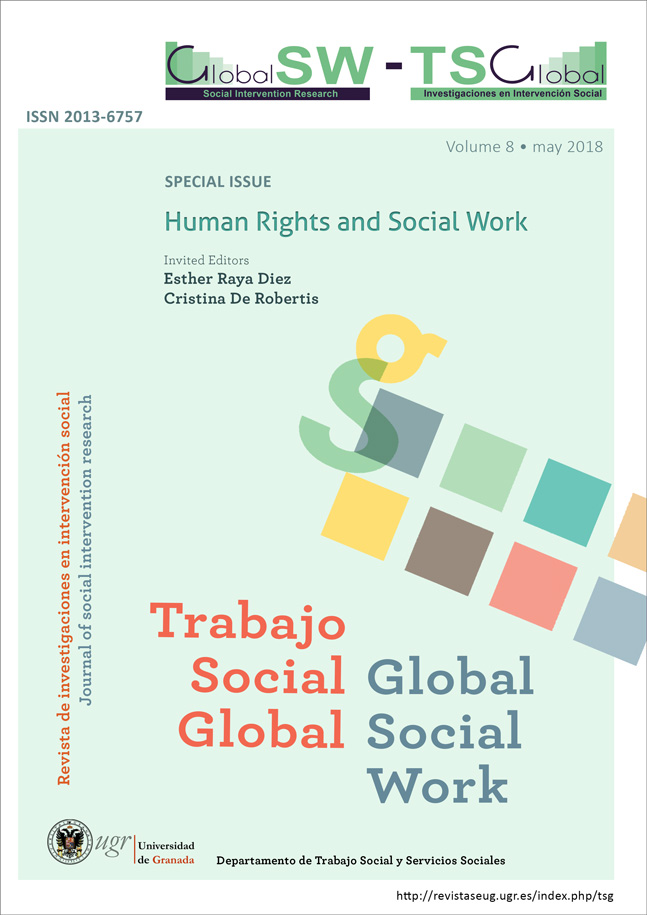Training in Human Rights in Higher Education
DOI:
https://doi.org/10.30827/tsg-gsw.v8i0.7432Keywords:
Learning, Skills, Citizenship, Citizenship education, Learning environment, Cultural diversity, Educational indicators, Human RightAbstract
This paper presents the findings of the ABDEM project, which deals with the incorporation of the Human Rights Based Approach in Higher Education in the Maghreb countries. An analysis of the status quo on Human Rights in the universities and countries of the Consortium has been carried out to perform a diagnostic evaluation which has then shaped the design of an online training of trainers. Education in Human Rights is a conditio sine qua non for the development of a critical and active citizenship. The article focuses on this relationship and on the need to strengthen Human Rights Education in all educational programs; in this context, the ABDEM project, and in particular its training programme, are presented as a case study. The main characteristics of the training programme are the transversal nature of its approach, the design of human rights learning from an interdisciplinary perspective, the implementation of competence-based learning, and the proposition of service learning as an active methodology to connect the university with the civil society. The conclusions highlight the interest in supporting training programs that incorporate the use of information technologies as a means to strengthen the development of a critical citizenship and connect the increasingly digitalised students with the problems of the societies they live in.
Downloads
References
Briones, E. y Lara, L. (2016). Educación ética en la Universidad a través del diálogo multicultural. Comunicar, XXIV (47), 99-107, doi: https://doi.org/10.3916/C47-2016-10
Collis, B. y Moonen, J. (2011). Flexibilidad en la educación superior: revisión de expectativas. Comunicar, XIX (37), 15-25, doi: https://doi.org/10.3916/C37-2011-02-01
European Commission (2013). Report to the European Commission on improving the quality of teaching and learning in Europe’s higher education institutions. Luxembourg: Publications Office of the European Union. doi:10.2766/42468
European Commission / EACEA / Eurydice (2014). Modernisation of Higher Education in Europe: Access, Retention and Employability 2014. Eurydice Report. Luxembourg: Publications Office of the European Union. doi:10.2797/72146
Gómez, M. y Raya, E. (2018). Incorporar los ODS en los estudios de Grado: Aplicación práctica. En Clara J. Santos (coord.). Formulación de los nuevos espacios docentes (pp. 239-253). Madrid: Ed. Tecnos.
Martínez, M. (2010) Aprendizaje Servicio y construcción de ciudadanía activa en la universidad: la dimensión social y cívica de los aprendizajes académicos. En Miguel Martínez (ed.). Aprendizaje servicio y responsabilidad social universitaria (pp. 11-26). Barcelona: Ed. Octaedro.
McCloskey, E. M. (2012). Docentes globales: un modelo para el desarrollo de la competencia intercultural. Comunicar, XIX (38), 41-49. doi: https://doi.org/10.3916/C38-2012-02-04
Naciones Unidas (2004). Programa Mundial para le eduación en derechos humanos. Asamblea General. Resolución A/RES/59/113. Recuperado de https://documents-dds-ny.un.org/doc/UNDOC/GEN/N04/483/07/pdf/N0448307.pdf?OpenElement
___________ (2010). Proyecto de plan de acción para la segunda etapa (2010-2014) del Programa Mundial para la educación en derechos humanos. Asamblea General. Documento A/HRC/15/28. Ginebra: Oficina del Alto Comisionado de las Naciones Unidas para los Derechos Humanos. Recuperado de http://www2.ohchr.org/english/bodies/hrcouncil/docs/15session/A.HRC.15.28_sp.pdf
_________ (2012a) Programa mundial para la educación en derechos humanos. Segunda etapa. Plan de Acción. Documento HR/PUB/12/3. Nueva York y Ginebra: Oficina del Alto Comisionado de las Naciones Unidas para los Derechos Humanos y UNESCO. Recuperado de
http://www.ohchr.org/Documents/Publications/WPHRE_Phase_2_sp.pdf
_________ (2012b). Indicadores de Derechos Humanos. Guía para la medición y la aplicación. Documento HR/PUB/12/5. Nueva York y Ginebra: Oficina del Alto Comisionado de las Naciones Unidas para los Derechos Humanos. Recuperado de http://www.ohchr.org/Documents/Publications/Human_rights_indicators_sp.pdf
_________ (2017). Informe de la Relatora Especial sobre los derechos culturales. Asamblea General. Documento A/HRC/34/56. Consejo de Derechos Humanos, Informes. Recuperado de
http://www.ohchr.org/SP/HRBodies/HRC/RegularSessions/Session34/Pages/ListReports.aspx
Nóvoa, A. (2010). La construcción de un Espacio Educativo Europeo: Gobernando a través de los datos y la comparación. Revista Española de Educación Comparada, 16, 23-41
Raya, E. (2017). El proyecto ABDEM: una orientación indispensable. En Vega, A. (Coord.) Enfoque Basado en Derechos Humanos en la Educación Superior, un estudio comparado de Europa y el Magreb (pp. 25-62). Pamplona: Ed. Thomson Reuters.
Raya, E. y Gómez, M. (2016). Relación universidad-sociedad: dos propuestas con metodología de aprendizaje servicio. Revista Opción, nº especial 10, 529-547.
Robertson, R. (2000). Glocalización: tiempo-espacio y homogeneidad-heterogeneidad. Zona Abierta, nº 92-93, 213-242.
UNESCO (2009). Conferencia Mundial sobre Educación Superior. La nueva dinámica de la educación superior y la investigación para el cambio social y el desarrollo. Comunicado final. Ref: ED/2009/CONF.402/2. París: Unesco. Recuperado de http://www.unesco.org/education/WCHE2009/comunicado_es.pdf
______ (2015). Incheon Declaration for Education 2030: Towards inclusive and equitable quality education and lifelong learning for all. Incheon, Korea: World Education Forum 2015. Recuperado de http://unesdoc.unesco.org/images/0023/002338/233813M.pdf
UNICEF / UNESCO (2008). Une approche de l’éducation pour tous fondée sur les droits de l’homme. París : UNESCO. Recuperado de
http://unesdoc.unesco.org/images/0015/001588/158891f.pdf
Villa, A. y Villa, O. (2007). El aprendizaje basado en competencias y el desarrollo de la dimensión social de las universidades. Educar, 40, 15-48.
Downloads
Published
How to Cite
Issue
Section
License
Authors publishing in this journal agree to the following terms:
- Authors retain their copyright. They guarantee to this journal the right to a first publication of the work submitted to initiate the editorial process.
- Authors know that their work is published under a Creative Commons License which allows others to share it, with a recognition of the work's authorship and its initial publication in this journal.
- Authors share with Global Social Work explotation rights of the work that has been published in this journal, authorizing the execution of a free reproduction, distribution and public communication. Authors know that their work will be stored on servers and reproduced in digital format for inclusion in institutional repositories and databases that will facilitates free access to the full text of the work.
- Authors may distribute the version of the work published in this journal (for example, to an institutional repository or publish it in a book), with the explicit acknowledgment of its initial publication in this journal.
Copyright on the texts published in Trabajo Social Global -Global Social Work, as well as editorial policy of the journal refering to self-file and deposit in institutional or thematic repositories, are identified in the database























